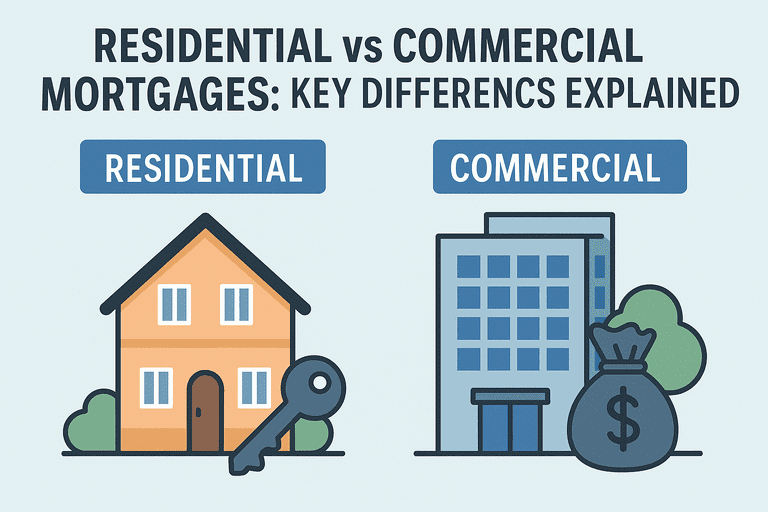Buying property is a significant financial decision, whether for personal use or business purposes. Understanding the distinction between a commercial mortgage and a residential loan is crucial for borrowers who want to make informed investment decisions. From business property loans to traditional home financing, each type of mortgage serves a different purpose and has unique terms and requirements.
What Is a Commercial Mortgage?
A commercial mortgage is a loan used to purchase properties intended for business or investment purposes. Unlike residential loans, which focus on homes for personal living, commercial mortgages fund:
Office buildings
Retail spaces
Warehouses
Multi-unit apartment complexes (5+ units)
Lenders typically evaluate the property’s income potential and the borrower’s business financials, making these loans more complex than residential mortgages.
Key Features of Commercial Mortgages:
Higher interest rates than residential loans
Shorter repayment terms, usually 5–20 years
Larger down payment requirements, often 20–30%
Income-driven approval process based on projected rental or business revenue
Residential Mortgages: Traditional Home Financing
A residential mortgage is designed for primary homes or second homes. Lenders focus primarily on the borrower’s personal financial health, such as credit score, debt-to-income ratio, and employment history.
Key Features of Residential Mortgages:
Lower interest rates than commercial loans
Longer repayment terms, typically 15–30 years
Down payments as low as 3–20% depending on loan type
Simpler approval process focused on personal income
This type of mortgage is ideal for individuals or families looking to purchase a property for personal living rather than generating rental income.
Business Property Loan vs Residential Loan: How They Differ
When comparing a business property loan with a residential mortgage, several critical differences emerge:
Approval Criteria: Commercial lenders review business plans, projected income, and lease agreements, while residential lenders focus on personal credit and income.
Interest Rates: Commercial mortgages generally carry higher rates due to increased risk.
Down Payment Requirements: Business loans often require a larger down payment to mitigate lender risk.
Loan Terms: Shorter commercial mortgage terms lead to higher monthly payments but faster repayment, whereas residential mortgages spread costs over decades.
Property Usage: Residential loans are for personal living spaces; commercial loans are for income-generating or business properties.
Why Understanding Residential vs Commercial Mortgages Matters
Choosing the wrong mortgage type can lead to unexpected costs or financing difficulties. For investors considering multi-unit properties or businesses that occupy space, a commercial mortgage might be the best option. Meanwhile, homebuyers looking for personal residences should stick with residential loans.
Making the right choice ensures:
Predictable monthly payments
Alignment with long-term financial goals
Compliance with lender requirements
Tips for Borrowers Considering Commercial Mortgages
Evaluate Property Income Potential: Lenders will base approval on expected revenue.
Prepare Business Documentation: Include financial statements, tax returns, and business plans.
Consider a Portfolio Approach: Some lenders offer flexible terms for borrowers with multiple investment properties.
Work with Experienced Mortgage Brokers: Specialized brokers can help navigate complex commercial loan structures.
Conclusion: Choosing the Right Mortgage for Your Needs
Whether purchasing a home or investing in a business property, understanding the differences between residential vs commercial mortgages is essential. From interest rates to approval requirements, each loan type serves distinct purposes. By carefully evaluating your financial situation, property goals, and long-term plans, you can select the mortgage that aligns with your objectives.
For more tools, calculators, and mortgage insights, visit CalculatingAMortgageLoan.com.
Sources:
